Collaboration with an Afro-Brazilian artist for Africa Month

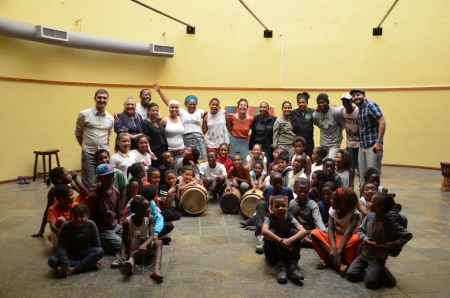
Workshop with children in the community of Langa
Dr. Alessandra Ribeiro from Campinas, Brazil was invited by the Faculty of Humanities to commemorate Africa Month at UCT. Dr Ribeiro came to UCT to present Jongo, a traditional art form that involves dancing, drumming and singing. She taught five workshops, delivered a public lecture and participated in the annual South African College of Music show at the Baxter Theatre.
The project was instigated by Dr. Alan Carneiro, Brazilian lecturer of Portuguese at UCT, with the support of the Brazilian Consulate of Cape Town and the Ministry of Foreign Affairs from Brazil. The programme was implemented by the Brazilian Government in a drive to enhance its relations with the African Continent.
Since 2003, the Brazilian commercial engagement with Africa has increased fourfold and the number of embassies expanded from 18 to 37. As a result of this expansion, cultural diplomatic initiatives emerged, such as the initiation of the lectureships at UCT and the University of Pretoria.
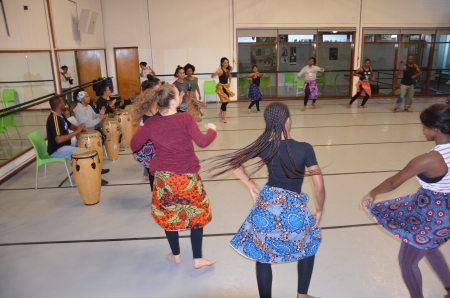
Workshop in the School of Dance
Since Dr Carneiro's arrival at UCT, the Portuguese Languages section has been endeavouring to understand the complex relations between Brazil and Africa. The Portuguese Language Section has been incorporating as a theme the intercultural relations among the Portuguese-speaking countries, into their courses, with a special focus on the diasporic cultural productions and the African cultures of Mozambique and Angola. In this regard, Dr. Carneiro has been building connections and identifying projects in the Faculty of Humanities that can enhance this aim.
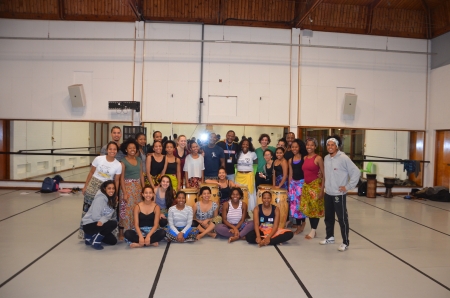
Workshop in SA College of Music
The project African-Brazilian Connections: exploring the art of Jongo in Cape Town was, for example, brought to fruition by collaboration with a group of lecturers from the Department of African Music, Dr. Sylvia Bruinders, Dizu Plaatjies and Paul Rommelaere and Maxwell Xolani Rani from the School of Dance, who planned and developed activities to be presented by Alessandra Ribeiro. Dr Ribeiro was accompanied on the drums by Mestre Espirrinho, from Capoeira Cordão de Ouro group, who also teaches classes for the UCT Capoeira Society and is a guest lecturer of World Music at the SA College of Music.
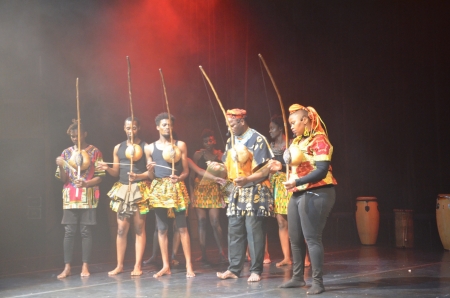
Jongo is a form of popular art in Brazil that combines dance, singing and percussion and is performed mainly in the Southeast of Brazil. Since 2005 Jongo has been considered intangible cultural heritage by the National Historic and Artistic Heritage Institute (IPHAN) of Brazil. The dance is part of the constellation of “belly-touching dances” (danças de umbigada) of this region, such as the “congada”, “moçambique de bastão”, “batuque de umbigada”, among others. These dances have their origin in the cultures of Southern Africa and in Brazil, this rhythm is considered one of the ancestors of the samba.
More than 250 people participated in the activities organized during the month of May, attending the workshops. There were workshops organized in the city with Capoeira Cordão de Ouro group and more than 50 children who practice capoeira with Professor Melodia in Langa participated in the workshop at Guga S’Thebes Arts and Cultural Centre. In the workshops, the participants learned how to clap their hands in the correct rhythm, to dance and to sing in Portuguese.
Alessandra Ribeiro, the master of Jongo, who recently completed her PhD in Urban Studies, at the Catholic University of Campinas, presented a lecture entitled African Matrix in Campinas, Territories, Memory and Representation. This was attended by Portuguese language students, as well as those from other courses in Humanities and specialists in urbanisation at UCT. Her talk was about the history of the occupation of the city by Black people and the contemporary landscape of cultural African practices in this urban space.
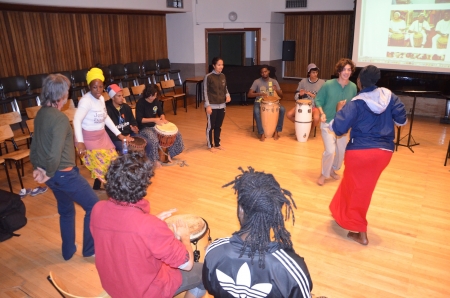
Workshop with Capoeira Cordão de Ouro group
To wrap up the events, Dr Ribeiro participated in a show at the Baxter Theatre, presented by students and lecturers from the the South African College of Music. The show, honouring her presence in Cape Town, was named JONGO, and was conceptualised to highlight the idea that Jongo is more than merely a form of dance, and comprises the union of people in a circle, sharing and learning together. The event attracted over 120 people and by the end of the performance, the audience were on stage, dancing with the artists.
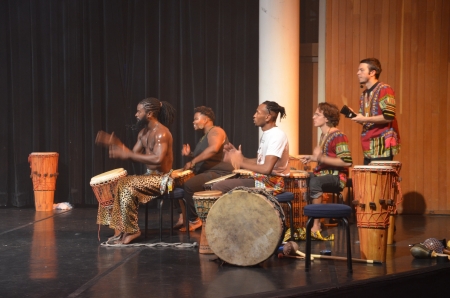
Drummers performing at the concert
Dr. Carneiro believes that the project contributed to raising the awareness of students, to the relevance of studying the Afro-Brazilian cultures and hopes that the event will stimulate future involvement. He also looks forward to developing interdisciplinary activities and teaching across a variety of disciplines, which transcend barriers and connects the areas of language, dance and music. One significant aspect that Dr. Carniero considers important in this kind of initiative, is the acknowledgment of the value of ancestral forms of knowledge from traditional populations, as a legitimate source of learning, that have the potential to be tools to reformulate the way teaching and learning is organized in higher education institutions.
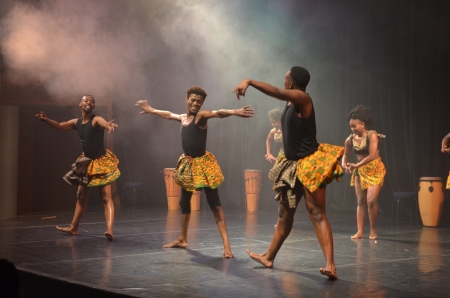
Dancers perform at the show at the Baxter Theatre

Everyone joining the artists on stage at the concert -